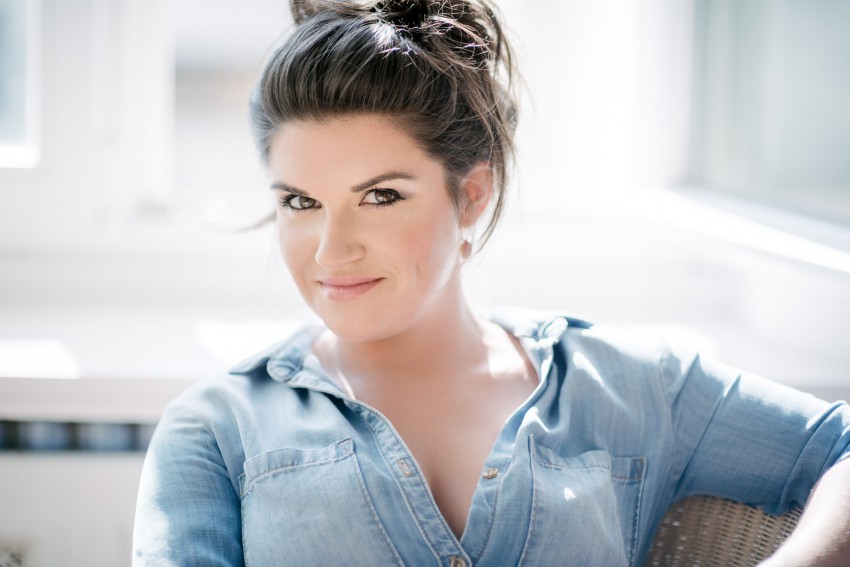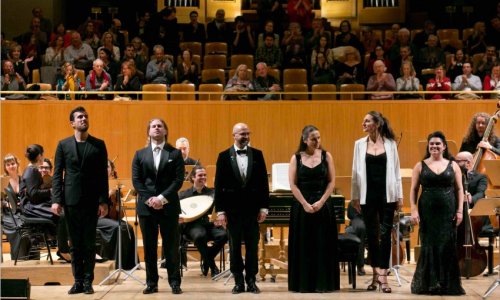
Kathryn Lewek: "Judge our work, not our bodies"
In an open letter published in the latest printed issue of Platea Magazine, the soprano Kathryn Lewek defends the work above the singers' body and physique, after being attacked by some classical music 'critics'.
Yo can get our printed edition in this link
Birgit Nilsson was once asked, “Is singing fun?” She replied, “Of course singing is fun. Everyone sings when they are happy - I'm sure you do, too, sometimes. The birds are singing when they are busy building their nests and having their family, and if they were not happy, they would not sing.”
Nilsson is right, of course: performing artists do our best work when we feel at our best. And we often do feel good: the exhilaration after a successful performance, the creative joy of building a production with a talented team, the delight of nailing that high note that has been elusive for three months. If we didn’t have those elated feelings in connection with our craft, we wouldn’t choose to be artists.
And yet we feel constant pressure to produce the very best we can give. Our obligation to provide truthful, unique, moving, and entertaining performances on the stage can also be soul-crushing. In that interview, Nilsson went on, “On the other hand, when you are a professional singer, it cannot only be fun because there are so many things to think about and everything has to be perfect. It's like making and serving a meal in a restaurant — the guests should be satisfied, too. Most of the time, one cannot enjoy one's efforts as much as one wants. Even the chef in the kitchen cannot enjoy the good meal he's serving to the guests in the restaurant.”
We itinerant performing artists know the hard work we do and sacrifices we make for our “guests”. Late nights on the stage or at rehearsals far from home often mean missing out on family events. The exhaustion associated with constant travel infringes on quality time even when we are home. We’re endlessly establishing new routines in new cities to try to keep our bodies healthy. We may connect deeply and quickly with the colleagues we are working with in a production, but still long for permanence in a community. For many of us, “living the dream” means living a life of intense loneliness.
Some of us are lucky enough to have supportive partners who can battle that loneliness with us. But many singing partners abandon the idea of becoming parents because it seems impossible to raise a family with the reality of their lifestyle. Those who do have children often have to leave them behind for weeks or even months at a time to maintain their careers.
When my husband and I decided to expand our family, I ended up singing on stage internationally well into my third trimester. I was very fortunate to work for companies that were accepting of my condition, though it was made easier for them that I was mostly singing Queen of the Night and nobody seems to mind if their Queen is with child as she swears to disown her daughter. Good planning! The end of my long pregnancy and labor was trying, but then along came the greatest gift of our lives: our beautiful daughter.
I was scheduled to resume singing on stage just six weeks later. The scar from my C-section was barely healed. I was exhausted and struggling with postpartum anxiety. I was adjusting to being a new mom and supporting my family at the same time. I received the okay from my doctor to resume normal activity just the day before I went to the Met to rehearse Magic Flute, which I would go on to perform less than a week later.
Since giving birth one year ago, I have traveled with my family to eight countries, and have driven thousands of miles with my daughter in the back seat. It’s hard enough to pursue this crazy, peripatetic career solo, but packing up the whole family to travel the world can daunt even the most dedicated singers.
I have breastfed my baby backstage or in between rehearsals at numerous opera houses in the USA and abroad, and have also followed my singer husband to his jobs. We stick together like birds of a feather whenever our schedules allow, which means even more travel. I have nursed in dozens of airports and pitstops, and pumped breast milk into bottles in a myriad of odd places, such as theater shower stalls, restaurant bathrooms, parking lots and in dressing rooms during wig and makeup changes. Along the way I have struggled to show myself love, patience and understanding; I have tried to be as kind to myself as I would to a friend who was returning to work so soon after enduring major surgery. I have sought to heed the supportive words from family and friends who insist that I am a badass fierce and sexy new mama-
diva. But even this fortress of support could not protect me from carelessly cruel critics this past summer while I was performing at the Salzburg Festival.
Opera is a multimedia experience, and so there are many elements to be critiqued. The singers, crew, design team, director, conductor, chorus master, and orchestra all have a part to play. We are all creators. Critics, too, have an important role: to inform the broader public about our art. The best critics provide insights that are accessible to the uninitiated, but also probe the depths of the work and its interpretation.
Yet too often in opera criticism today, we are confronted with amateurish evaluations of the visual experience while scant attention is paid the work of the vast majority of an opera’s creators. The work that all those people contribute to the art should be scrutinized, of course. But the shape of a singer’s body? How is that relevant? That the soprano is “stocky” or “buxom”, that the staging consists of “fat women spreading their legs”? Critics who so blatantly lack self-awareness, empathy and plain decency should not have the privilege of having their words published as their profession.
But alas, it's not only the critics. After my recent bodyshaming fracas, many of my singer friends and colleagues wrote to me with their own (often far worse) experiences, and far too many of their stories involved people on our side of the business, even supposed mentors.
Voice teachers and coaches who bodyshame their students under the guise of “career advice” should feel ashamed themselves. Casting directors who insist on hiring a great body over a great voice should be reeducated on the reasons audiences buy tickets, donate money to opera companies, and give standing ovations. Audiences don’t come because the soprano literally looks like she's dying of consumption. They come because of her dedication to her dramatic art and the sheer mastery of her voice and technique. It’s because when she finally collapsed in the last thunderous cadence of the orchestra, she made you feel as if a part of you died with her.
A healthy body is the foundation of a healthy instrument, but being skinny is not an indication of health for every body. I have spoken with many successful singers of all shapes and sizes about the crucial role that health plays in having a sustainable career on the stage. We all agree: it’s not about being skinny. It’s about keeping our bodies in whatever healthy shape they need to be to do our jobs. To produce the Olympian sounds that can pierce the gloom over the orchestral ocean like a lighthouse guiding wayward ships home. To sing.
We are not objects. We are humans living our lives, often in a vulnerable state. Sometimes we are pregnant. Sometimes we are ill. Sometimes we are on medications that wreak havoc on our bodies. Sometimes we are homesick. Sometimes we are mourning the loss of a loved one. Sometimes we just added a new loved one to the family, and despite the pain, exhaustion and physical limitations, we still must support our families with our work.
None of us chose this career because it was easy. We deserve respect for the sacrifices that we bear in order to to bring more light into this dark world.
Judge our work, not our bodies.
Kathryn Lewek.








